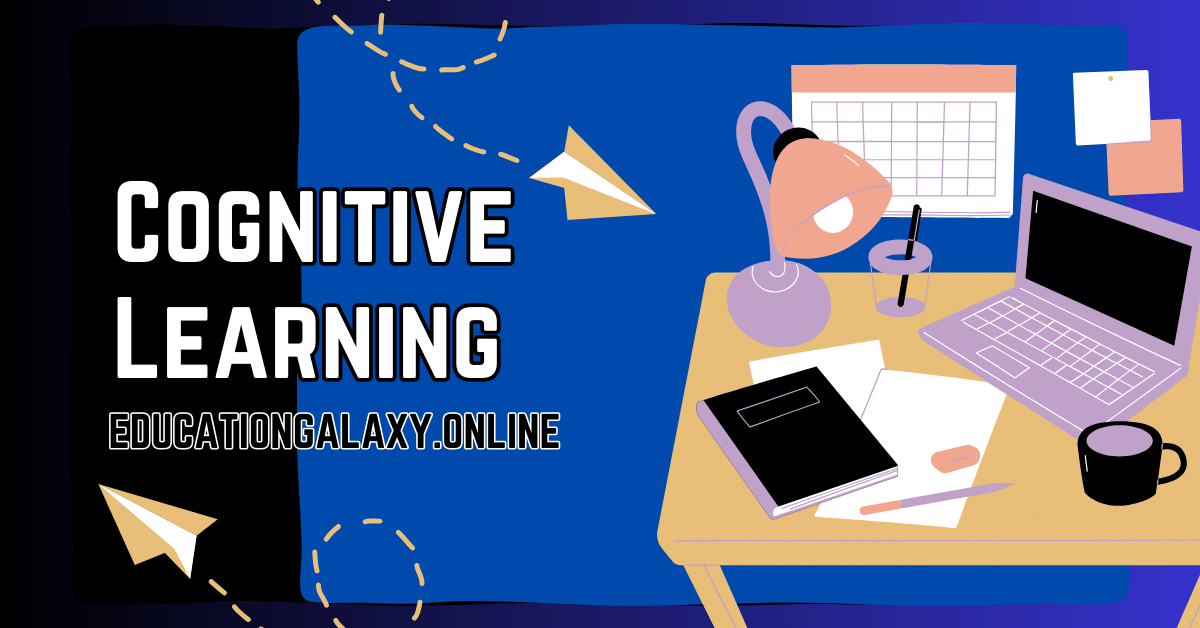Introduction
Cognitive learning is the mental process of acquiring knowledge and skills through the active engagement of the mind. It involves using attention, perception, memory, and thinking to understand and retain information. Cognitive learning plays a vital role in education, training, and personal development, empowering individuals to become critical thinkers, effective problem-solvers, and lifelong learners.
Read Must These Articles:
Edustaff Login: Empowering Educational Excellence Through Enhanced Workflows and Communication
What Is Post-Secondary Education: A Multifaceted Exploration
Jackson Structured Programming: A Comprehensive Guide
How cognitive learning works: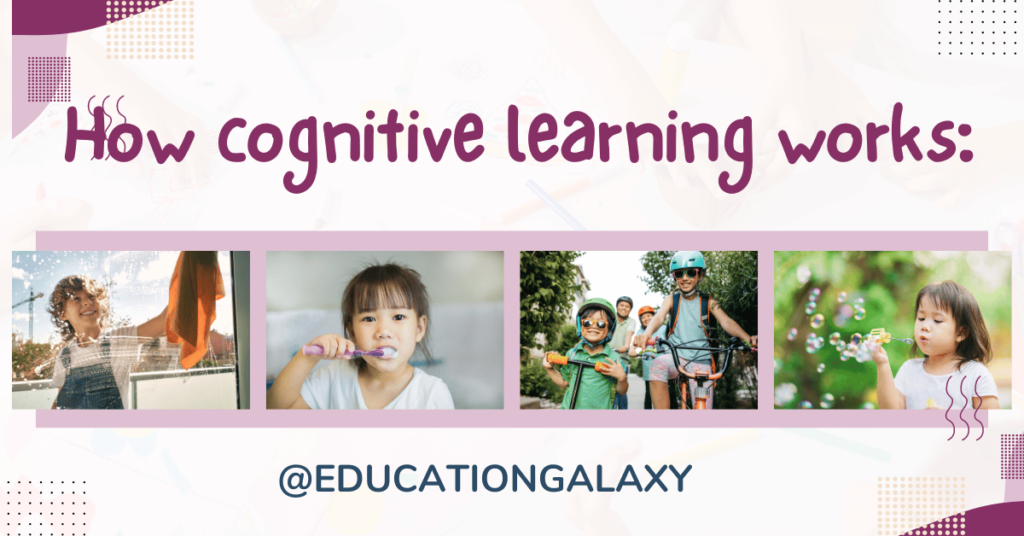
Cognitive learning is a process that involves the active engagement of the mind in understanding and retaining information. Here is how cognitive learning works:
- Attention: Cognitive learning begins with attention, which involves focusing on and selecting relevant information from the environment. Attention is essential for processing and encoding new information into memory.
- Perception: Once attention is focused on information, perception comes into play. Perception involves interpreting and organizing sensory information to make sense of the world. It enables individuals to understand and categorize incoming data based on their knowledge and experiences.
- Memory: Memory plays a crucial role in cognitive learning. It involves encoding, storing, and retrieving information for later use. Cognitive learning relies on short-term and long-term memory processes to retain knowledge and skills.
- Thinking: Critical thinking and problem-solving are integral aspects of cognitive learning. Thinking processes such as analysis, synthesis, and evaluation allow individuals to process information, make connections, and apply their knowledge to solve problems. Cognitive learning enhances cognitive skills and strategies that facilitate practical thinking and problem-solving.
Individuals can actively acquire, process, and retain new knowledge and skills by engaging in cognitive processes such as attention, perception, memory, and thinking. Cognitive learning promotes more profound understanding, critical thinking, and problem-solving abilities, shaping the way individuals interact with and learn from their environment.
Types of Cognitive Learning: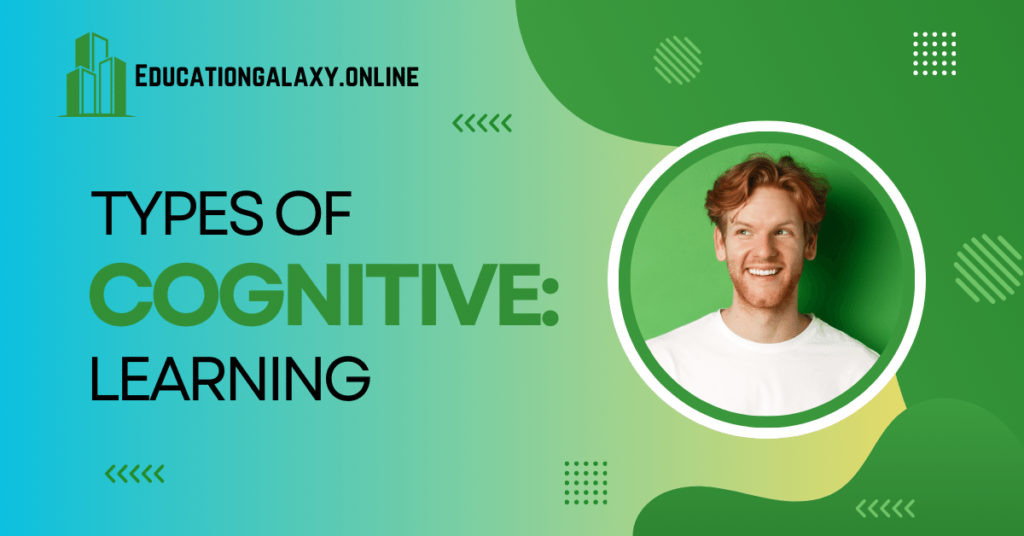
1. Declarative Learning:
- It involves acquiring knowledge about facts, concepts, and information.
- Focuses on remembering and recalling specific information, such as names, dates, and definitions.
- Examples: Learning historical events, scientific principles, or vocabulary words.
2. Procedural Learning:
- It involves developing skills and procedures through practice and repetition.
- Emphasizes the acquisition of step-by-step instructions and the ability to perform tasks effectively.
- Examples: Learning to play a musical instrument, ride a bike, or perform a surgical procedure.
3. Concept Learning:
- It involves forming mental representations of categories and ideas.
- It focuses on understanding the underlying principles and relationships between different concepts.
- Examples: Learning the concept of “triangle” by identifying its properties and characteristics.
4. Problem-Solving Learning:
- It involves applying knowledge and skills to solve novel and complex problems.
- Emphasizes critical thinking, analysis, and the ability to generate and evaluate solutions.
- Examples: Solving mathematical problems, designing scientific experiments, or developing strategies for real-world challenges.
Each type of cognitive learning engages different mental processes and strategies. Understanding these types helps educators and learners tailor learning experiences to specific learning goals and objectives.
Factors Influencing Cognitive Learning: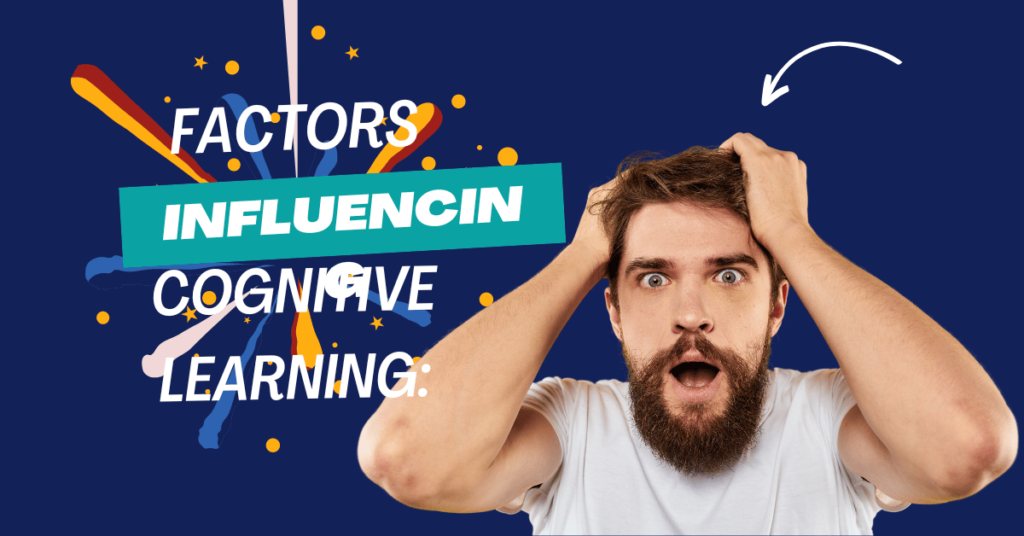
1. Motivation:
- Intrinsic motivation: Internal drive to learn for personal satisfaction or interest.
- Extrinsic motivation: External rewards or incentives that encourage learning.
- Motivation significantly impacts attention, effort, and persistence in cognitive learning.
2. Prior Knowledge:
- Existing knowledge and experiences influence how new information is processed and understood.
- Prior knowledge can facilitate learning by providing a foundation and context for new concepts.
- It can also hinder learning if prior knowledge is accurate or complete.
3. Cognitive Abilities:
- Individual differences in attention, memory, and problem-solving skills affect cognitive learning.
- Cognitive abilities can be influenced by genetics, environment, and experiences.
- Educators can adapt instruction to meet the diverse cognitive skills of learners.
4. Instructional Methods:
- Teaching strategies, techniques, and materials impact cognitive learning.
- Effective instructional methods engage learners, promote active learning, and facilitate meaningful connections.
- Consider learner preferences and learning styles when choosing instructional methods.
5. Environment:
- Physical and social factors in the learning environment can influence cognitive learning.
- A positive and supportive environment fosters motivation, reduces distractions, and promotes collaboration.
- Factors such as classroom atmosphere, peer interactions, and resource access play a role.
Understanding these factors helps educators and learners optimize learning experiences by addressing individual needs, creating supportive environments, and employing effective instructional strategies.
Benefits of Cognitive Learning: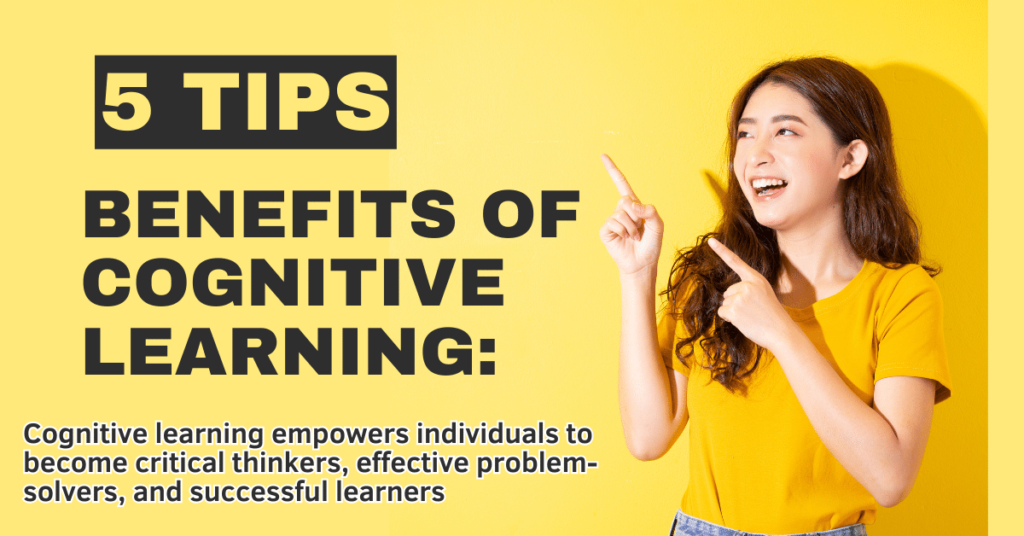
- Promotes Deep Understanding: learning fosters a more profound comprehension of concepts and principles through active engagement, meaningful connections, and the ability to apply knowledge in various contexts.
- Enhances Critical Thinking: It develops critical thinking skills by requiring learners to analyze, evaluate, and synthesize information, enabling them to reason logically, identify biases, and make informed decisions.
- Improves Problem-Solving Skills: Learning equips learners with cognitive tools and strategies to approach and solve problems systematically, fostering analytical thinking, creative problem-solving, and evaluation of multiple solutions.
- Supports Long-Term Retention: learning promotes long-term retention by deeply processing and understanding information, making it easier for learners to retain and retrieve knowledge over time.
- Facilitates Transfer of Learning: learning enables the transfer of knowledge and skills to new situations and contexts as learners develop a deep understanding of underlying principles and concepts that can be applied to various challenges.
- Cognitive learning empowers individuals to become critical thinkers, effective problem-solvers, and successful learners with a solid foundation for lifelong learning in diverse domains.
Applications of Cognitive Learning: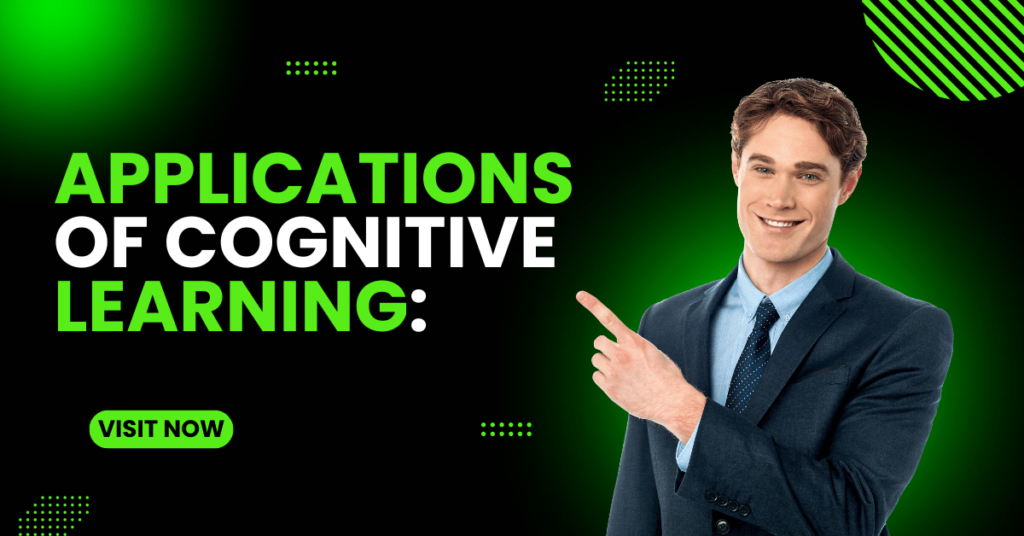
- Education: learning principles guide the design of effective teaching methods that promote active engagement, critical thinking, and deep understanding. By incorporating cognitive learning strategies, educators can enhance student learning outcomes and foster a love for knowledge.
- Training and Development: learning is crucial in training and development programs. It helps individuals acquire new skills, enhance existing knowledge, and develop problem-solving abilities necessary for career advancement and organizational success. Training programs leverage cognitive learning techniques to maximize knowledge retention and transfer to on-the-job performance.
- Workplace Learning: learning is essential for continuous learning and professional development. It empowers employees to adapt to changing job demands, embrace new technologies, and enhance their skills through on-the-job training and self-directed learning. By applying cognitive learning principles, organizations can foster a culture of lifelong learning and innovation.
- Healthcare: learning is vital in the healthcare industry, where professionals must acquire and retain complex medical knowledge, make critical decisions, and solve intricate problems. Cognitive learning strategies enhance healthcare professionals’ ability to diagnose and treat patients effectively, improving patient outcomes.
- Personal Development: learning extends beyond formal educational settings and plays a significant role in personal development. Through cognitive learning techniques, individuals can engage in self-directed learning, explore new hobbies, and acquire new skills. This lifelong learning approach contributes to personal growth, intellectual curiosity, and well-being.
- By embracing cognitive learning in various domains, individuals and organizations can unlock their full potential, drive innovation, and thrive in a rapidly changing world.
FAQs on Cognitive Development, Processes, and Enhancement
1. What is cognitive development?
Cognitive development refers to the changes and advancements in an individual’s mental abilities, including attention, memory, language, problem-solving, and decision-making, as they progress from childhood to adulthood.
2. What are cognitive processes?
Cognitive processes are the mental operations and mechanisms involved in acquiring, storing, processing, and retrieving information. They include perception, attention, memory, thinking, and language.
3. What are cognitive skills?
Cognitive skills are the abilities that enable individuals to process and use information effectively. They encompass problem-solving, decision-making, critical thinking, memory, and learning.
4. What is cognitive psychology?
Cognitive psychology studies mental processes, including perception, attention, memory, language, problem-solving, and decision-making.
5. What are cognitive functions?
Cognitive functions are specific mental abilities that contribute to overall cognitive performance. They include memory, attention, language, and executive functions such as planning and decision-making.
6. What is cognitive neuroscience?
Cognitive neuroscience is an interdisciplinary field that combines neuroscience and cognitive psychology to explore the neural mechanisms underlying cognitive processes and functions.
7. What is cognitive enhancement?
Cognitive enhancement refers to interventions or techniques that improve or augment cognitive abilities, such as memory, attention, and problem-solving.
8. What are cognitive abilities?
Cognitive abilities are the fundamental mental capabilities that allow individuals to process and use information. They include intelligence, memory, attention, and reasoning.
9. What is cognitive load?
Cognitive load refers to the mental effort and resources required to process and perform cognitive tasks. Managing cognitive load is crucial for effective learning and performance.
10. What is cognitive training?
Cognitive training involves exercises and activities to improve and strengthen cognitive abilities like memory, attention, and problem-solving skills.
11. What is cognitive learning?
Cognitive learning refers to the mental processes involved in acquiring knowledge and skills through active mind engagement. It encompasses attention, perception, memory, and thinking processes.
These FAQs provide brief and accessible answers to common questions about cognitive development, processes, skills, and enhancement, offering a foundational understanding of this important study area.
Conclusion:
Cognitive learning is a fundamental process that empowers individuals to acquire knowledge, develop skills, and navigate the complexities of the modern world. By understanding how cognitive learning works, different types of cognitive learning, factors that influence it, its benefits, and its applications, we can harness its power to optimize learning experiences and foster lifelong learning.
we can create effective learning environments that foster deep understanding, critical thinking, and lifelong learning


